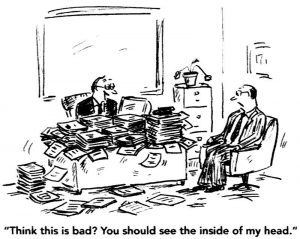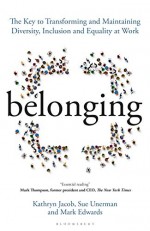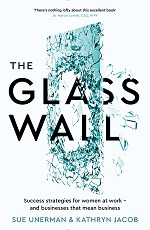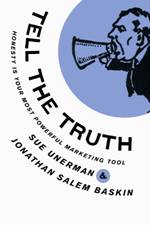 How clear is your desk? Mine is perpetually cluttered. With apologies to those amongst us who love order above all things, I find it easier to work amongst an element of clutter. It seems to help my thinking and to drive cross pollination, an essential ingredient of creativity for me.
How clear is your desk? Mine is perpetually cluttered. With apologies to those amongst us who love order above all things, I find it easier to work amongst an element of clutter. It seems to help my thinking and to drive cross pollination, an essential ingredient of creativity for me.
There’s some personal items: photos of my family, objects with significant meaning including the mug that Kathryn Jacob (CEO of Pearl and Dean and my co-author for The Glass Wall) gave me which is too boastful to use, but holds my collection of pens, and a stapler that looks like a goldfish.
Many people have to have clear desks – its company policy. I’m lucky to have the option. There has long been a fashionable corporate idea that there should be no personal items on people’s desks. No photos, kids’ drawings, no mugs. It’s meant to add to everyone’s focus, eliminate distractions.
This wouldn’t have worked for me, particularly when I first returned from mat leave. Photos of my children were essential – without the photos I would have missed them much too much.
In the MediaCom Connected Podcast we ask a series of regular questions including: “If your home fell down, every living person and thing is safely outside, and you were able to retrieve 3 personal items what would they be?” This question always reveals so much about our guest.
Sometimes, occasionally, the guest of the show has absolutely no answer. These are the minimalists. Those people I would guess who would thrive with a clean desk policy. Bruce Dailey at Twitter, for example, couldn’t think of a single item he cared enough about. Mostly however, there’s a reply, often very moving, and usually about something that has personal and emotional value to the speaker.
Stephen Allan (MediaCom’s worldwide ceo) talked about the sailor’s ribbon that his father had been given on the notorious Voyage of the Damned – a ship that sailed with Jewish refugees from Germany on the brink of war after his grandfather had been imprisoned, and then released from a concentration camp and allowed to travel on this ship as a concession to international pressure; but with no safe harbour.
Dom Joseph (Captify’s ceo) would grab a picture of his mum at 19, and an original photograph of Kurt Cobain.
MediaCom’s current ceo Kate Rowlinson would take the poster from the first time she saw Queens of the Stone Age perform live in Australia.
Rob Norman (digital guru) has a copy of Allan Ginsberg’s poem Angkor Wat annotated by the author.
And Campaign’s Claire Beale would pick up a musical box in the shape of a chalet that belonged to her dad.
I could go on, there are many more. All well and good, but had we better keep them out of the workplace because they are distracting?
In Rebel Ideas, the new Matthew Syed book, he recounts a scientific experiment that proves that the “Lean Office” ie the clean desk policy, isn’t efficient or productive.
Exeter University professor Craig Knight carried out a controlled test of two groups of people. The first group worked in a clean desk minimalist environment. The second group had plants, and pictures on the walls. Group 2 performed 15% better. Knight then took a third group and allowed them to personalise their workspace, however they wanted to. These spaces were very different. Some of them were minimal. Others looked like my desk on a cluttered day. Productivity soared. Up 30%. “Give people autonomy and they come up with something better than anything else” concludes Knight. Syed comments that the power in this lay with personalisation: ”People could design spaces that they liked. They could mould the space to their own characteristics. This may sound like a small thing, but it is actually a very big thing. It was an approach that took diversity seriously.”
Makes cleaning the office more tricky. Might be worth it for 30% improvement in productivity.
Delivering diversity is not just about statistics about the make up of the workforce. It’s about adjusting the workplace to suit individuals and allowing everyone a sense of belonging.



It’s time for the forecast
Tuesday, January 21st, 2020Weather forecasts have become more accurate. Even in Britain. Though the public still loves to complain when they get it wrong.
We also love nothing more than a famously failed prediction. There’s Michael Fish who, a few hours before the Great Storm of 1987 broke, on 15 October 1987, said during a forecast: “Earlier on today, apparently, a woman rang the BBC and said she heard there was a hurricane on the way. Well, if you’re watching, don’t worry, there isn’t!”. The storm was the worst to hit South East England for three centuries. The “unsinkable Titanic”. The forecast from Mary Somerville that “TV won’t last, its just a flash in the pan”. “Rock and roll will be gone by June” (Variety Magazine 1955). And of course Decca Records on refusing to sign the Beatles : “Guitar music is on the way out.”
There’s media predictions each year. How often do we check in on their accuracy. In clearing the clutter from a bookcase I came across a book of predictions about TV in the 21st century that was published in 2004.
Mark Howe, now md, emea agencies, at Google, created the book for the long gone TV sales house: ids. In his introduction he wrote: “one common thread running through is that our business has seen an ‘evolutionary change’…yet conspicuous by their absence are the accompanying changes to our working practices which we seem unwilling or unable to tackle… risk-aversion and a desire to keep the status quo.” Tough words, yet there are still areas of our industry that are characterised by this, and they are not the areas that are thriving.
Paddy Barwise rightly pointed out that “interactive digital TV is not the internet on your TV”.
Mandy Pooler wrote: “media agencies are the ones with cash to invest in a creative product.”
In 2004 I wrote: “There is no longer a line between media and creativity” and “in the future a team will optimise airtime and space according to streams of data… and TV buyers will continue to spend summer on the golf course and have an annual punch-up at Christmas”. Call me Mystic Meg.
What’s up for 2020?
MediaCom’s 2020 media predictions are here.
I clearly see that there’s a movement strategically from the binary, either/or, thinking, that plagued 2019 in all kinds of ways, to seeing the bigger picture, considering all of the communications systems effects and how they together contribute to brand growth.
And I predict that diversity and inclusion movements will continue to gain momentum, and do it with meaning rather than being just a tick box exercise. The best companies will start to reap the benefits – the pot of gold at the end of the diversity rainbow. Those companies that don’t really mean it though, the ones where it isn’t a cultural imperative, but just an HR endeavour, they’ll struggle to recruit and retain key talent.
Diversity of thinking is as crucial in this as heritage, race, religion, sexual preferences or disability. Unless everyone in the business has a real sense of belonging and a sense that they are responsible for the culture there won’t be progress.
For a sunny forecast for 2020, real change in this respect is needed and new ideas must gain traction (as Howe stated back in 2004).
Posted in MediaComment | No Comments »